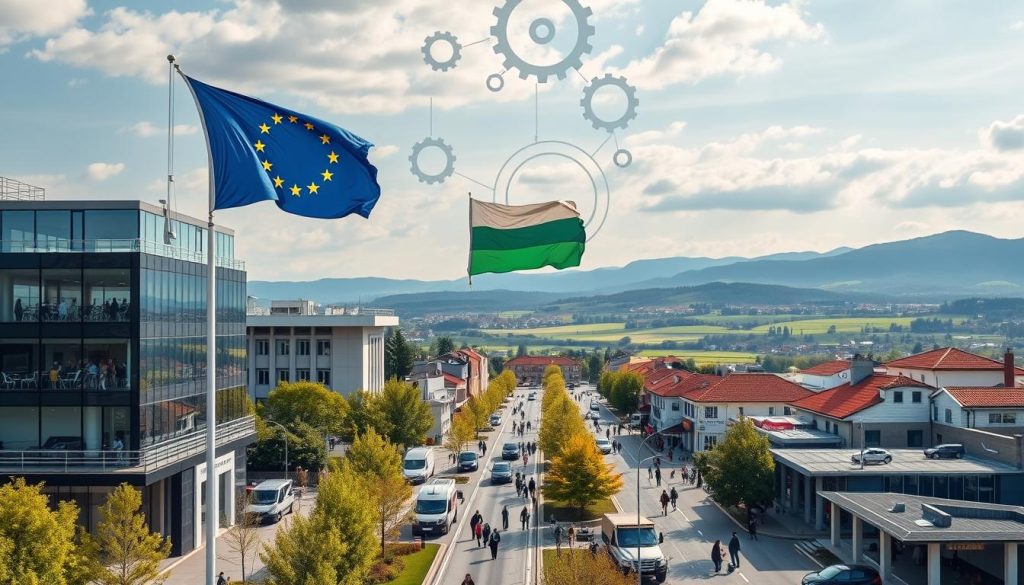Getting to know the business culture in Bulgaria is key for UK professionals looking to enter this lively market. This guide offers a detailed look at Bulgarian corporate etiquette. It helps you smoothly join the local business scene. We’ll cover how to build relationships and master communication styles, showing you the special traits of doing business in Bulgaria.
We’ll also look at important topics like professional etiquette, how decisions are made, and regional differences. With these tips, you’ll be ready to work well with others and achieve success in Bulgaria.
Understanding the Essence of Business Culture in Bulgaria

Bulgarian business culture is a blend of history and modern practices. The country moved from a socialist to a market economy. This change made businesses more flexible, focusing on being efficient and innovative while keeping traditional values.
In Bulgaria, teamwork is key. Building trust and personal connections is crucial for business. Doing business with people you know is common. This approach creates a strong, loyal network.
To grasp Bulgarian corporate culture, you must understand these relationships. Even as individualism grows, teamwork is still essential. Being patient and engaging personally helps build strong connections.
The Significance of Relationships in Bulgarian Business

In Bulgaria, building strong relationships is key to business success. Trust is crucial, shaping how deals and partnerships are made. It’s important to make personal connections and engage in social activities to build trust.
Building Trust and Rapport
Rapport is very important in Bulgarian culture. A friendly handshake and a chat can start business talks. It’s good to take time to build relationships before business talks start.
Small talk and showing interest in local customs can help build trust. This makes relationships stronger.
- Participate in social events to deepen connections.
- Share personal stories or experiences to create a bond.
- Be consistent and reliable, reinforcing trust over time.
The Role of Networking
Networking is vital in Bulgaria for making professional contacts. Bulgarians often look for new opportunities through referrals. This makes networking events and social gatherings key for growing your network.
- Attend local events to meet potential collaborators.
- Engage in community-related discussions to demonstrate commitment.
- Utilise social media platforms to establish a presence in the market.
Using these strategies can lead to lasting and valuable relationships. These are essential for success in Bulgarian business.
Professional Etiquette: Dos and Don’ts

Knowing about professional etiquette is key to doing well in Bulgarian business. It’s important to understand the meeting etiquette and dress code. This knowledge can make your professional interactions better.
Meeting Etiquette
Being on time is very important in business meetings. Showing up on time shows respect for others. It’s also good to prepare well before meetings, having all your documents ready.
When you meet someone, a firm handshake is the norm. Keep eye contact to show you’re engaged and confident. Starting with some small talk can help you connect better. Listening well is also crucial, showing you value others’ opinions.
Dress Code Expectations
In Bulgarian business, formal clothes are preferred. Looking professional is important as it shows respect and seriousness. Men should wear suits, and women should wear tailored dresses or skirts.
What you wear can affect how others see you. Wearing the right clothes can make a good impression. It helps build trust and credibility with colleagues and clients.
Communication Styles in Bulgaria

In Bulgaria, knowing how people communicate is key to getting along. They use both words and body language to send messages. Sometimes, they prefer not to be too direct, especially when talking about sensitive subjects.
Being aware of these ways of communicating makes talks better and helps avoid misunderstandings.
Verbal and Non-verbal Communication
In Bulgaria, people use many ways to talk. Some are very direct, while others rely more on body language and how they sound. Looking into someone’s eyes shows you care and are interested.
Knowing how to read these signs is important for working well with others in Bulgaria.
The Importance of Context
Context is very important in Bulgarian communication. Knowing the background helps understand the message better. Things like culture, where you are, and who you’re with affect how messages are seen.
This shows why it’s crucial to think about the context. Without it, messages can be misinterpreted.
Bulgaria’s Business Hierarchy and Structure

The Bulgarian business world often follows traditional structures. These structures put a lot of emphasis on seniority and authority. Companies usually have a top-down approach, where the top management makes most of the decisions.
This strict structure shows how Bulgaria values experience and established relationships in business. In many companies, the CEO or founder has a lot of power. They set the company’s vision and strategy.
Below the top, there’s a clear hierarchy with different managerial roles. Each role is in charge of a specific department. Employees are expected to respect their superiors, following the cultural norms.
- Top Management: Includes pivotal figures such as CEOs, Managing Directors, and C-level executives.
- Middle Management: Comprised of department heads and project managers responsible for supervising teams.
- Operational Staff: Engaged in day-to-day functions, they follow directives from their superiors.
The way companies are structured affects how managers lead. While some firms are trying new, more open ways of working, many still value hierarchy. Knowing how to work within this structure is key to doing well in business.
Decision Making in Bulgarian Companies

In Bulgarian business culture, knowing how decisions are made is key for working well together. Companies usually choose between making decisions by consensus or through an authoritarian style. Each method affects how the workplace runs and how productive it is.
Consensus vs. Authoritarian Styles
Consensus decisions involve many people. This makes everyone feel included and valued, boosting morale and teamwork. But, it can slow down making important choices.
Authoritarian decision-making is fast, with one person or a few making the call. It quickly solves problems and avoids disagreements. Yet, it might make others unhappy if they don’t get a say.
Foreigners working in Bulgaria need to understand these decision-making ways. Knowing how they work can help teams work better together. Matching strategies to local ways can make the workplace more friendly.
Navigating Business Meetings and Negotiations

Effective business meetings in Bulgaria need good preparation and clear strategies. Success depends on knowing who’s there and what they want. Important steps include making clear plans, using time well, and creating a space for open talk.
Preparation Tips for Meetings
Here are some tips for preparing for business meetings in Bulgaria:
- Learn about the people attending to make the talk relevant.
- Have a clear plan to keep the meeting on track.
- Get all the documents ready before the meeting.
- Set aside specific times for each topic to stay focused.
- Keep in mind cultural differences that might affect the meeting.
Negotiation Tactics and Strategies
Learning how to negotiate well in Bulgaria is key. Here are some strategies to help you succeed:
- Be patient and let the conversation develop naturally.
- Listen actively to show you care and understand.
- Be ready to give in to reach an agreement.
- Building trust is important for lasting relationships.
- Stay flexible and adjust your approach as needed.
Cultural Nuances: Understanding Bulgarian Traditions

Getting to know Bulgarian traditions is key for business success in the region. Bulgarian business holidays show the country’s deep heritage and community values. Knowing these holidays helps professionals respect local customs and build stronger ties with Bulgarian colleagues, improving teamwork.
Business Holidays and Observations
Bulgarian business holidays shape how professionals work all year. Important public holidays include:
- January 1st – New Year’s Day
- March 3rd – Liberation Day
- May 1st – Labour Day
- May 24th – Slav Script and Bulgarian Culture Day
- September 6th – Unification Day
- November 1st – National Revival Leaders Day
- December 25th – Christmas Day
These holidays bring people together for celebrations and activities. They show Bulgaria’s cultural traditions. By observing these days, international businesses can better connect with the local culture.
Respecting these holidays can make a big difference in business talks and meetings. It’s wise to plan meetings around these times. Many Bulgarians use these days to spend time with family and friends, showing their community spirit.
The Impact of European Union Membership on Business

Bulgaria’s entry into the European Union has changed its business world a lot. The EU membership has brought in new rules that make business clearer and more stable. This has helped local companies reach more markets, improving Bulgaria’s business ties with the EU and boosting competition.
Being part of the EU single market is a big plus. It lets Bulgarian businesses trade freely, without extra costs or rules. This has made it easier for them to work with companies from other countries, attracting more foreign investment. Now, they can sell to a wider range of customers across Europe.
But, there are still challenges. Companies face tough rules and must follow EU laws. Small and medium-sized businesses find it hard to keep up, which can hurt their chances in the market. As Bulgaria gets more involved with the EU, it’s important for businesses to stay innovative and flexible to overcome these issues.
Time Management: Punctuality and Deadlines

Understanding time management in Bulgaria is key for good business interactions. The country’s punctuality norms mix tradition with modern views. Showing up on time for meetings shows respect and helps build strong relationships.
In Bulgaria, meeting deadlines is very important. People value timely project completion but also understand delays can happen. They encourage talking openly about any delays.
Compared to the UK, Bulgaria’s culture is more flexible with schedules. Still, sticking to deadlines is always valued. This shows commitment and responsibility.
- Arrive punctually for meetings.
- Communicate proactively about deadlines.
- Be prepared for discussions regarding time management in Bulgaria.
Gender Roles in Bulgarian Business Culture

In Bulgaria, the way men and women work together in business is changing. This change comes from new views on equality and what people want to achieve. More women are becoming leaders, showing they can do the job and helping the economy grow.
Women in Leadership Roles
Women in Bulgaria are making a big difference in fields like finance, tech, and healthcare. They are breaking down old ideas about who should lead. Their work brings more diversity and new ideas to companies.
- In corporate governance, women often show a team-based leadership style, creating welcoming spaces.
- Successful women leaders in Bulgaria are seen in both local and global businesses.
- Even with progress, women still face biases and hurdles in their careers.
There’s a growing push for gender equality in work. This includes helping women, offering mentorship, and pushing for better work-life balance. As Bulgarian business evolves, the future looks bright for women who want to lead.
Local Customs That Affect Business Interactions

Knowing local customs is key for good business in Bulgaria. Gift-giving shows respect and appreciation. Dining etiquette also plays a big role in building professional relationships. Both show the rich culture of Bulgaria.
Gift-Giving Norms
Gift-giving is crucial in Bulgaria for professional relationships. Choose gifts that show thought and respect. Here are some ideas:
- Local products, such as Bulgarian honey or wine
- Quality stationery or office decor
- Books or cultural artefacts related to Bulgaria
When to give a gift matters. It’s best during a meeting or a special occasion. Following these customs shows respect and helps in smoother interactions.
Dining Etiquette During Business Meals
Dining in Bulgaria shows respect and hospitality. Here are some dining customs to follow:
- Be on time, as punctuality is important.
- Wait for the host to start eating.
- Good table manners are essential, like not eating with your mouth full.
- Drink alcohol in moderation, as it may be offered.
Talk about common interests, avoiding sensitive topics. Sharing a meal shows unity and strengthens business relationships.
Regional Variations in Business Practice across Bulgaria

It’s key to know the regional differences in business practices in Bulgaria to succeed in local markets. The way businesses operate, interact, and build relationships varies a lot. This is due to historical, economic, and cultural factors that influence business attitudes and behaviours across the country.
Urban vs Rural Business Environments
In Bulgaria’s cities, like Sofia and Plovdiv, business is fast and dynamic. This is because of globalisation and modern tech. Here, professionals use new ways to make decisions and talk to each other. They value openness and networking in building business ties.
But, in rural areas, things are different. Here, traditional values and slower decision-making are common. Building strong personal relationships is also key. Knowing these differences helps in creating better strategies for each area.
- Communication: In cities, it’s all about being direct and to the point. But in rural areas, it’s more about telling stories and having deep talks.
- Decision-Making: Cities go for quick, team-based decisions. Rural areas prefer slower, more consensus-based choices.
- Relationship-Building: In cities, networking is everything. But in rural areas, it’s all about building lasting trust and relationships.
Challenges in Bulgarian Business Culture for Foreigners

Entering the Bulgarian market can be tough for foreigners. It’s key to grasp cultural subtleties to overcome business culture hurdles. Foreigners might struggle with different communication styles, strict hierarchies, and how decisions are made.
Language barriers can cause confusion in talks and deals. While many Bulgarians speak English, relying only on it can limit building strong ties. These connections are crucial for success in Bulgaria.
Adjusting to Bulgarian ways needs patience and a willingness to learn. It’s important to understand local customs and etiquette. This includes valuing personal connections in business and respecting traditional practices.
- Engage in local networking opportunities to enhance trust and rapport.
- Consider language training to facilitate better communication.
- Respect hierarchical structures while appreciating collaborative decision-making.
Success Stories: International Companies Thriving in Bulgaria
Bulgaria is becoming a top choice for international companies. Its good business environment and key location in the European Union are big draws. Tech giants like SAP and VMware have set up in Sofia, using the city’s talent to boost their global standing.
These stories show how companies in Bulgaria can grow by using local skills and creativity. This is key to their success.
The outsourcing sector is also booming, with Accenture and TELUS International leading the way. They use Bulgarian talent to deliver top-notch services. This shows Bulgaria’s potential as a key player in Eastern Europe’s outsourcing market.
These successes offer valuable lessons for other companies looking to enter Bulgaria. They show the importance of building strong relationships, understanding the local culture, and using clear communication. These strategies are crucial for success in Bulgaria.
As the business scene in Bulgaria keeps changing, these success stories are a beacon of hope. They show the great opportunities available to foreign investors in this vibrant country.

